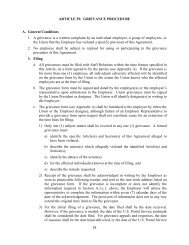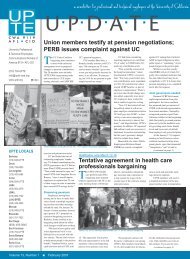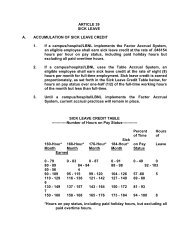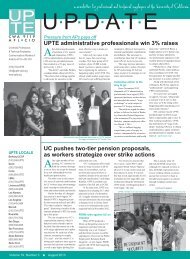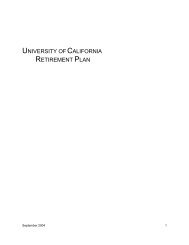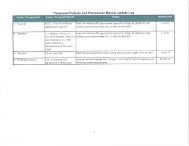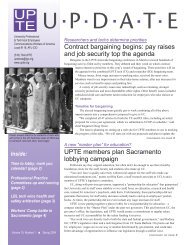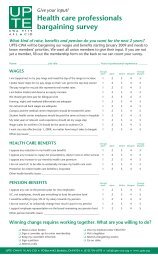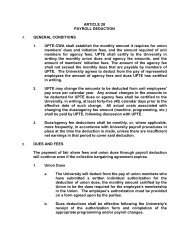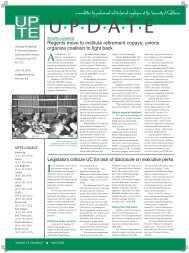Create successful ePaper yourself
Turn your PDF publications into a flip-book with our unique Google optimized e-Paper software.
UP<br />
TE<br />
‘Grinch<br />
a newsletter for professional and technical employees at the University of California<br />
UPDATE<br />
■ ■ ■ ■ ■<br />
University Professional<br />
& Technical Employees<br />
Communications Workers<br />
of America Local <strong>9119</strong>,<br />
AFL-CIO<br />
(510) 704-<strong>UPTE</strong><br />
info@upte-cwa.org<br />
www.upte-cwa.org<br />
Joe Beigner, photo<br />
UCLA techs take their lunch hour<br />
to observe a bargaining session.<br />
<strong>UPTE</strong> LOCALS<br />
Berkeley<br />
(510) 848-<strong>UPTE</strong><br />
Davis:<br />
(530) 759-0803<br />
Los Angeles:<br />
(310) 443-5484<br />
Irvine:<br />
(949) 854-8783<br />
LANL:<br />
(505) 662-4679<br />
LBNL:<br />
(510) 665-7722<br />
LLNL:<br />
SPSE (affiliate):<br />
(925) 449-4846<br />
Riverside:<br />
(951) 781-7922<br />
San Diego:<br />
(619) 296-5090<br />
San Francisco:<br />
(415) 753-<strong>UPTE</strong><br />
Santa Barbara:<br />
(805) 685-3661<br />
Santa Cruz:<br />
(831) 429-<strong>UPTE</strong><br />
campaign’ wins two days off<br />
<strong>UPTE</strong> continues to fight for fair pay<br />
The effort continues at the<br />
bargaining table to obtain<br />
fair compensation for<br />
research (RX) and technical (TX)<br />
employees.<br />
The two groups are in joint<br />
bargaining for a three-year<br />
contract, to cover wages as well as<br />
a variety of issues such as benefits,<br />
parking, transfers, promotions and<br />
reclassifications.<br />
<strong>UPTE</strong>’s wage proposal<br />
includes cost-of-living increases<br />
equal to UC’s increase from the<br />
state at 0% this year, and projected<br />
at 3% in each of the next two<br />
years. It also includes full step<br />
increases in all three years for<br />
every TX and RX employee, as<br />
well as step increases for those<br />
“topped out” in their job titles for<br />
five years or more.<br />
“We know the University has<br />
the money for step increases for all<br />
continuing employees each year,”<br />
said chief bargainer Doug Owen,<br />
“because the savings from staff<br />
turnover can easily pay for steps.”<br />
You can see the numbers for<br />
yourself in <strong>UPTE</strong>’s wage analysis<br />
posted at . All research<br />
and technical employees are now<br />
on a step pay system, eligible for<br />
annual 2% to 4.5% increases each<br />
year, unless “topped out” in their<br />
classification.<br />
UC continues to claim, in the<br />
face of clear evidence to the<br />
contrary, that it cannot afford the<br />
step increases. The University<br />
insists that all steps must be paid<br />
for out of a reduced across-theboard<br />
cost of living increase. This<br />
would mean techs and researchers<br />
would only get 1.5% of the 3% the<br />
state put in this year’s UC budget.<br />
“There is no reason why we<br />
shouldn’t get the entire 3% acrossthe-board<br />
cost of living increase<br />
for this year, plus step increases<br />
for every year including 2004/05,”<br />
according to <strong>UPTE</strong>’s president<br />
Jelger Kalmijn.<br />
Revealing UC’s budget<br />
UC has refused to comply<br />
with last year’s state budget<br />
reporting language to show how<br />
much it saves due to employee<br />
turnover. The University does not<br />
want the Legislature to know that<br />
it diverts approximately 1% of our<br />
pay every year to other uses.<br />
“<strong>UPTE</strong> will be contracting<br />
with an independent accounting<br />
firm to verify our cost analysis,<br />
and will post the report on our<br />
website,” notes Kalmijn.<br />
University bargainers also<br />
proposed some new and alarming<br />
contract language at a bargaining<br />
session in late January.<br />
UC wants to be able to<br />
reassign employees with disabilities<br />
unilaterally and without<br />
posting the positions. The<br />
University will not promise that<br />
these transfers would be at the<br />
same or higher rate of pay, or that<br />
the employees reassigned would<br />
have any say at all in the process.<br />
Make your voice heard<br />
<strong>UPTE</strong> activists and staff are<br />
holding hundreds of worksite<br />
meetings across the state to<br />
jump-start discussions about<br />
how to put pressure on UC to<br />
finish our contract negotiations<br />
and give us a real raise.<br />
In addition to publicizing the<br />
many ways UC can afford a raise,<br />
union members are discussing<br />
actions to pressure the University,<br />
including strikes (see page 2).<br />
Your input is needed. Please<br />
contact your local <strong>UPTE</strong> chapter to<br />
find out when a discussion is<br />
scheduled in your work area, or<br />
come to one of the bargaining<br />
conferences in late <strong>Feb</strong>ruary (see<br />
details in the box below).<br />
UC grinch finally gets<br />
holiday cheer<br />
Technical and research<br />
employees ended up with two paid<br />
days off over the holiday break,<br />
after UC tried to deny the leave to<br />
workers covered by union<br />
contracts while granting it to nonrepresented<br />
groups.<br />
The winning formula included<br />
<strong>UPTE</strong> members flooding UC<br />
administrators’ mailboxes with<br />
“stop being a grinch” messages.<br />
The union also targeted UC’s<br />
public image by placing ads with<br />
the same message in newspapers<br />
up and down the state.<br />
Discuss ♦ strategize ♦ mobilize!<br />
BARGAINING<br />
CONFERENCES<br />
2/26 in Los Angeles<br />
2/27 in Berkeley<br />
see box below<br />
for locations<br />
Working together for fair compensation<br />
On the legal front, <strong>UPTE</strong> filed<br />
an unfair labor practice charge<br />
with the state Public Employment<br />
Relations Board about the campus<br />
closure. And our hard working<br />
bargaining team kept the pressure<br />
on in negotiations.<br />
When UC Associate VP Joe<br />
Mullinix received over 500 emails<br />
about the two days off, UC finally<br />
came to agreement. On the eve of<br />
the holiday break, UC agreed to<br />
the union’s conditions. Employees<br />
who took vacation during the<br />
break got credit for the days, and<br />
those who worked the holidays<br />
were entitled to two other days off<br />
with pay in January. (In research<br />
work areas, staff have until the end<br />
of March to take the days.)<br />
UC refused to grant the two<br />
days off to clerical employees,<br />
insisting that they give up demands<br />
for decent raises. <strong>UPTE</strong>-represented<br />
health care professionals<br />
working at medical centers<br />
received across-the-board pay<br />
increases last year and will also get<br />
them this year, so they were not<br />
eligible for the days off.<br />
What will it take to get UC to agree to <strong>UPTE</strong>’s wage proposal? First and<br />
foremost, working together. All of us – TX and RX employees, other <strong>UPTE</strong><br />
members, and our sisters and brothers in other UC unions – need to support<br />
each other for a just resolution.<br />
➤ Come to a bargaining conference. Saturday, <strong>Feb</strong>ruary 26, Los Angeles:<br />
10am to 3 pm at the Bolter Hall (Engineering) Penthouse. Sunday, <strong>Feb</strong>ruary 27,<br />
Oakland: 10am to 3 pm at <strong>CWA</strong> Local 9415, 1831 Park Blvd.<br />
➤ Explain the need for a real raise to your coworkers and get their support for our<br />
collective union efforts.<br />
➤ Participate in <strong>UPTE</strong>’s campaign to send periodic emails to UC administrators,<br />
donors and state legislators. We won’t ask you to send more than one a month.<br />
Email us at to sign up.<br />
➤ Talk to your supervisor and principal investigator to let them know what’s going<br />
on in bargaining. They are often very supportive and willing to help put pressure on<br />
University decisionmakers. <strong>UPTE</strong> has a ready-made letter you can use or edit<br />
(contact your <strong>UPTE</strong> local for a copy).<br />
➤ Sign a strike pledge card, available at . We don’t<br />
want to strike, but we may have to in order to get UC to provide decent raises.<br />
Volume 11, Number 1 ■ <strong>Feb</strong>ruary 2005
Organizing for fairness<br />
Millions given to<br />
UC executives<br />
$2.4 million in bonuses went to<br />
65 top executives at UC’s<br />
medical centers in 2004. The<br />
payments averaged $36,000<br />
but went as high as $82,000,<br />
according to a report to the<br />
Regents leaked to the San<br />
Francisco Chronicle.<br />
UC Davis’ chief executive<br />
officer Robert Chason received<br />
that $82,000, which is 20% of<br />
his annual salary of $410,000.<br />
UCSF executive Mark Laret<br />
was next on the list, with a<br />
$79,495 bonus, or 18.3% of his<br />
salary.<br />
The university claims it must<br />
pay the bonuses because<br />
medical center executives “are<br />
paid well below the market.”<br />
The bonuses come at a time<br />
when most rank-and-file UC<br />
workers have gone years<br />
without a raise, and face UC<br />
stonewalling at the bargaining<br />
table over what should be<br />
routine step increases.<br />
The report was made public by<br />
AFSCME 3299, which had<br />
obtained the information<br />
through a public records<br />
request. That union has been<br />
fighting for living wages for its<br />
members – mostly food service<br />
workers and custodians – many<br />
of whom work two jobs or rely<br />
on public benefits in a struggle<br />
to survive.<br />
Protestors at a UC Regents’ meeting last<br />
fall mingle with a paper maché pig<br />
representing a UC executive<br />
<strong>UPTE</strong> members contemplate strike<br />
To strike means to withhold one’s<br />
labor – for a day, for a week, or<br />
longer. Before striking, <strong>UPTE</strong><br />
utilizes many actions to pressure the<br />
University to bargain fairly and settle.<br />
Building membership strength, participating<br />
in informational pickets, legislative lobby<br />
days, media campaigns, getting support<br />
from other unions, faculty and students all<br />
contribute to the fair settlement of a<br />
contract. Striking is the last option, but often<br />
the one that is ultimately effective.<br />
It is time to start planning a strike over<br />
technical (TX) and research (RX) employees’<br />
contracts. UC’s non-responsiveness at<br />
the bargaining table does not seem likely to<br />
change otherwise.<br />
Providing no pay increases year after<br />
year, even though there is money available,<br />
is a shortsighted policy and causes longterm<br />
harm to the University. Our experienced<br />
and talented colleagues leave UC for<br />
more lucrative and rewarding jobs everyday.<br />
We need to make sure that a policy of fair<br />
pay increases is established to stop the<br />
erosion of quality research and education.<br />
Past strikes have been successful.<br />
<strong>UPTE</strong> won its first contract and biggest<br />
raises with strikes lasting a couple of days at<br />
selected campuses. Academic student<br />
employees and nurses at UC have gained<br />
major wage and other improvements by<br />
planning and staging brief walkouts. After a<br />
recent strike at Yale University, employees<br />
won an eight-year contract with a minimum<br />
of 3% raises and step increases each year. In<br />
other industries, <strong>CWA</strong> (our national union)<br />
has gone on strike to contain the cost of<br />
health benefits. Historically, working<br />
conditions we take for granted were won<br />
through strikes, such as the eight-hour work<br />
day and union recognition.<br />
How do we win a strike?<br />
By sticking together and being visible.<br />
The more <strong>UPTE</strong> members participate and<br />
the more support they have from other UC<br />
workers, the greater the likelihood of<br />
success.<br />
<strong>UPTE</strong> is not alone in pushing for a fair<br />
pay system at the University. Currently, UC<br />
service workers (represented by AFSCME)<br />
and clerical workers (represented by CUE)<br />
are in the same bargaining situation. Unions<br />
for UC’s nurses, student employees and<br />
lecturers/librarians have committed to<br />
supporting <strong>UPTE</strong> and doing everything they<br />
can to encourage their members not to cross<br />
our picket lines.<br />
Other non-UC unions representing bus<br />
drivers, construction workers, and delivery<br />
drivers will not do business at UC if we are<br />
on strike. Support from students, community<br />
leaders and legislators will also contribute to<br />
a successful strike.<br />
For <strong>UPTE</strong> to call a strike requires a<br />
majority vote of the members. Once<br />
members have given strike approval,<br />
<strong>UPTE</strong>’s five systemwide elected officers<br />
and the union’s chief negotiator determine<br />
the time and duration of the strike. <strong>UPTE</strong><br />
has a strike fund, and provides a benefit for<br />
strike participation of $40/day.<br />
Two kinds of strikes are possible. We<br />
can select strategic days on particular<br />
campuses where we are best prepared for<br />
one-day work stoppages. Actions like these<br />
send a clear message to UC management,<br />
legislators, funding agencies and the public<br />
about how serious the situation is. This kind<br />
of action does not cause great financial<br />
hardship for our members.<br />
A strike of indefinite length would aim<br />
to halt work at UC until contract negotiations<br />
are settled. This is the most powerful<br />
tactic we have to achieve our bargaining<br />
goals. It would not be undertaken without<br />
exhausting other avenues of pressure.<br />
UC’s own budget<br />
committee supports<br />
staff salary increases<br />
Staff salaries are too low to ignore.<br />
They should be the University’s top priority<br />
in 2005-06.<br />
That’s the word from Michael Parrish,<br />
chair of the University Committee on<br />
Planning and Budget, writing last fall to<br />
George Blumenthal,<br />
chair of UC’s<br />
Academic Council.<br />
The committee<br />
was asked to develop<br />
priorities for this<br />
year’s UC budget in<br />
light of increased<br />
funding under the<br />
compact negotiated<br />
with the governor last<br />
year.<br />
While acknowledging<br />
recent “fiscal<br />
blows” to faculty and<br />
staff salaries,<br />
research, financial<br />
aid and student<br />
services and that<br />
there is no “magic<br />
bullet” to solve such<br />
Lisa Kermish, photo<br />
Elena Ricci at an <strong>UPTE</strong> steward’s<br />
training in Los Angeles.<br />
woes, the report recommends that UC’s top<br />
priority should be staff salaries and staff<br />
recruitment.<br />
“Another 3 percent in the personal<br />
pocketbook of an existing or new faculty<br />
member will do little to change the academic<br />
environment necessary to sustain his<br />
or her research and instructional activities,”<br />
wrote Parrish, emphasizing the need for<br />
“competent and dedicated staff” to support<br />
teaching and research.<br />
“Any percentage increase for staff in<br />
2005-06 should be greater than the faculty<br />
increase in order to compensate for the year<br />
in which staff did not receive an increase,<br />
but faculty members did,” the letter<br />
continues.<br />
It ranked priorities such as a reduction<br />
in the student-faculty ratio, pay increases<br />
for untenured faculty, and increases to<br />
student financial aid only slightly down the<br />
list.<br />
Know your rights!<br />
<strong>UPTE</strong> clarifies layoff<br />
policy, wins back pay<br />
The threat of an arbitration hearing has<br />
allowed <strong>UPTE</strong> to clarify important contract<br />
language regarding layoff rights.<br />
Eugene Dunlap, a technical employee<br />
and activist at UC Davis, was laid off from<br />
his position with insufficient advance notice.<br />
He was also given incorrect information<br />
regarding his preferential rehire and<br />
severance pay rights. The contract requires<br />
at least 60 days’ advance notice for layoff.<br />
If only 30 days’ notice is given, the employee<br />
receives an additional 30 days’ pay.<br />
<strong>UPTE</strong>’s position was that the meaning<br />
of this language in the TX/RX contract –<br />
and the HX contract also, for that matter – is<br />
clear: the employee(s) would receive a<br />
minimum of 60 days’ pay, either through 60<br />
days’ notice or as a combination of at least<br />
30 days’ notice and up to 30 days’ pay in<br />
lieu of notice. UC disagreed and argued that<br />
this language needed to be judged on a case<br />
by case basis. In Dunlap’s case, UC gave<br />
him less than 60 days’ notice but refused to<br />
pay Dunlap 16 days’ pay to make up the<br />
difference.<br />
Dunlap stated that it wasn’t just the 16<br />
days’ pay that was at stake but<br />
the “future protection of other<br />
workers regarding their layoff<br />
notice.”<br />
“After hours of give and<br />
take,” said Cliff Fried,<br />
<strong>UPTE</strong>’s executive vice<br />
president and steward for the<br />
case, “we were able to reach a<br />
settlement that strengthened<br />
the union’s contention that ‘60<br />
days means 60 days’ but that<br />
also made Dunlap ‘whole’ for<br />
losses he suffered.”<br />
UC agreed to investigate<br />
Dunlap’s service credit and<br />
correct any errors, and to pay<br />
him for the 16 days. It also<br />
agreed to convert them to<br />
vacation days in his new<br />
department if his old and new<br />
departments agreed. Dunlap will also<br />
receive a $100 reimbursement for health<br />
care costs. As to employee selection of<br />
layoff options (that is, whether an employee<br />
can choose severance pay or preferential<br />
rehire) UC agreed that employees are<br />
entitled to accurate information so they can<br />
make an informed choice.<br />
The most important achievement was to<br />
clarify that “the parties expect that in almost<br />
all cases the employee(s) will receive 60<br />
days’ notice (or combination of notice and<br />
up to 30 days’ pay in lieu of notice to equate<br />
to 60 days.” If, for some reason, these 60<br />
days are denied, the university must provide<br />
a reason at the request of the union or<br />
employee. UC agreed it would be rare that<br />
someone would be denied the full 60 days’<br />
notice. In those cases, the union will also<br />
have the right to grieve and arbitrate if<br />
necessary.<br />
Fried said this victory “demonstrates the<br />
power of not giving up and of defending the<br />
contract. Join the fight to defend and improve<br />
the contract – become active in your union.”<br />
2 | UPDATE
Around the state<br />
Two big victories in<br />
Irvine<br />
Two groups of UC Irvine employees<br />
have won major victories with the help of<br />
<strong>UPTE</strong> stewarding.<br />
Physician assistants, who knew they<br />
were underpaid, approached <strong>UPTE</strong> about<br />
obtaining an equity raise. The PAs had<br />
researched the market by looking at state<br />
and national salary figures through internet<br />
searches, inquiring about open positions at<br />
hospitals in the area and in comparable<br />
workplaces such as UCLA, and interviewing<br />
by their peers who work at Orange County<br />
hospitals.<br />
After compiling their findings, they<br />
initiated a meeting with Labor Relations.<br />
After a frustrating period that involved a<br />
series of stalling tactics and some misinformation,<br />
along with some good faith efforts on<br />
the part of management, serious negotiations<br />
finally began.<br />
Equity raises up to 28%<br />
The end result was equity adjustments<br />
ranging from 10% to 28% and a 21% range<br />
adjustment to the zone for new incumbents.<br />
“Teamwork led to this success,” according<br />
to Janette Carbone. “ I am grateful and<br />
proud of all of the physician assistants as<br />
well as very appreciative of the support of<br />
<strong>UPTE</strong>. We could not have done this had we<br />
not been united.”<br />
Physician assistant Renee Barton said<br />
<strong>UPTE</strong> representatives Sue Cross and Wendy<br />
Mullen “were spectacular, and we cannot<br />
thank them enough for all the late nights and<br />
commutes to UCI Medical Center on our<br />
behalf. I believe their knowledge and<br />
dedication to our endeavor directly impacted<br />
the success of our negotiation.”<br />
Teamwork also paid off when a group<br />
of child life specialists contacted <strong>UPTE</strong><br />
because they had been told they were<br />
exempt employees but then discovered they<br />
were non-exempt. Angie Carrillo said, “At<br />
first we were nervous, but the union gave us<br />
confidence, support, and education.” They<br />
filed a group grievance, which was denied at<br />
level one. They went into the level-two<br />
hearing armed with evidence from department<br />
logs, staff meeting notes, and a<br />
recording of the voice-mail message patients<br />
heard if they called the department on<br />
weekends. Management claimed they were<br />
not on-call, but the message clearly stated<br />
that, in case of emergency, the patient should<br />
contact the child life specialist “on call.”<br />
The appeal was decided in their favor,<br />
and they received back pay for on-call<br />
status, premium holidays, overtime and shift<br />
differential, ranging from $3,469 to $11,726.<br />
“Without the union,” said Carrillo, “we<br />
never would have seen this money.”<br />
Organizing for safety<br />
by Joan Lichterman<br />
<strong>Feb</strong>ruary is the starting point for unions<br />
to map their strategy to organize for safety.<br />
On <strong>Feb</strong>ruary 1, employers must post a<br />
summary of the previous year’s reported<br />
work-related injuries and illnesses “in a<br />
conspicuous place.” Employers with<br />
multiple worksites must post a separate form<br />
for each physical location, which UC does<br />
by campus.<br />
Individual workers and union representatives<br />
have a right to receive the complete<br />
OSHA log of reported injuries and illnesses<br />
by the next business day following a request,<br />
and to see the actual incident reports within<br />
a specified time as well. With these reports<br />
we can begin to see where the greatest<br />
number and most serious problems are, so<br />
we can start organizing to address them.<br />
Why did I write “reported” injuries and<br />
illnesses, and “begin” to see where the<br />
problems are? Not all illnesses and injuries<br />
are reported and, because of changes in<br />
OSHA’s record-keeping rules, it’s harder to<br />
see what some of them are.<br />
Repetitive injuries common<br />
The basic categories are “injury” skin<br />
disorder, respiratory condition, poisoning,<br />
hearing loss, and “all other illnesses” — plus<br />
specific provisions for recording needle<br />
stick injuries, TB, occupational hearing loss,<br />
and medical evacuation of injured persons.<br />
Musculoskeletal disorders (MSDs, also<br />
known as repetitive strain injuries, or RSIs)<br />
must be recorded, but the rule doesn’t define<br />
them and the OSHA log no longer has a<br />
specific place to post them. Will they posted<br />
Standing, left to right: <strong>UPTE</strong> Irvine steward Susan Cross, Senior Physician Assistant Henry<br />
Macias. Seated, left to right: Senior Physician Assistants Grace Tu, Jaroslava Teet, Janette<br />
Carbone, Joanne Manalo, Michael Blasko.<br />
be as injuries or put in the all other illnesses<br />
category, or some of both? This is one of the<br />
largest injury categories – if not the largest –<br />
at UC.<br />
Lack of reporting has to do with the<br />
rules: injuries and illnesses need to be<br />
Sue Cross, photo<br />
UCSD animal tech testifies at bargaining<br />
Animal techs are among those who<br />
have become active making their<br />
voices heard in bargaining. Among<br />
UC’s lowest paid employees, animal techs<br />
support research by caring for lab animals.<br />
But because of constant scheduling<br />
demands, animal techs have had a difficult<br />
time taking lunch breaks or vacation leave to<br />
attend bargaining sessions on the UCSD<br />
campus. So they decided to send a representative<br />
to voice their collective concerns.<br />
John Garcia, who had recently suffered a<br />
heart attack, likely due in part to stressful<br />
conditions at work, made a presentation to<br />
UC’s bargaining team about the need for<br />
better compensation.<br />
Pay is so low that many rely on food<br />
stamps and some work two full time jobs to<br />
make ends meet. Because housing is<br />
expensive near the UCSD campus, many<br />
travel from more affordable neighborhoods<br />
for up to five hours a day on public transportation<br />
to reach the UCSD campus. On<br />
reported only if they involve a death, days<br />
off work, restricted work or job transfer,<br />
medical treatment beyond first aid, loss of<br />
consciousness, or diagnosis of a significant<br />
injury or illness by a physician or licensed<br />
health care professional. Other factors<br />
include workers’ ignorance about the<br />
relationship between their work and their<br />
symptoms; fear of what will happen if they<br />
report injuries or of being in the Workers’<br />
Compensation system; employers’ denial<br />
that the problem is work-related; pressure<br />
not to report injuries; language barriers;<br />
difficulty proving an occupational disease is<br />
work-related, etc.<br />
After obtaining the OSHA log and the<br />
incident reports for each campus, we can<br />
start verifying the information in the OSHA<br />
log so we have a better picture of the actual<br />
number of injuries that are occurring, and<br />
training ourselves and our coworkers to<br />
identify health and safety problems in our<br />
workplaces. We need to use proven techniques<br />
to break through language and other<br />
barriers, define hazards that we want to see<br />
corrected or eliminated, and build a strong<br />
base of support to implement changes<br />
through safety committees, our stewards’<br />
network, and the union coalition.<br />
The last day in <strong>Feb</strong>ruary is International<br />
RSI Awareness Day — the only day of the<br />
year that isn’t repetitive — because work<br />
shouldn’t hurt!<br />
occasion, employees have camped outside<br />
under the bushes instead of making the long<br />
journey home each night.<br />
Garcia said animal techs have been<br />
offered an equity raise, but it is different on<br />
each campus – UCD’s animal techs were<br />
offered 10% whereas those at UCSD would<br />
get 4%. The union wants a fairer across-theboard<br />
equity raise for everyone.<br />
“We’re here working at UCSD with the<br />
animals for two reasons, one is the animals –<br />
we love the animals, and two is the research<br />
– we’re dedicated to the research,” said<br />
Garcia. “What if we do something here that<br />
helps find a cure for cancer? We want to be<br />
part of that.” But, he added, they need to<br />
support themselves and their families on<br />
decent wages as well.<br />
As bargaining continues, animal techs<br />
at UCSD and elsewhere continue to inform<br />
their coworkers of the issues and remain<br />
ready to take action to make UC see the<br />
justice of their demands.<br />
<strong>UPTE</strong> animal<br />
techs and<br />
their supporters<br />
at UCSD<br />
meet on their<br />
break to talk<br />
about<br />
bargaining.<br />
Win at UCSD Clinical Labs<br />
Late last year, <strong>UPTE</strong> activists in San<br />
Diego learned that some clinical laboratory<br />
scientists were angry with the union because<br />
they had been told by management that<br />
<strong>UPTE</strong> was holding up their equity raises.<br />
Wendy Mullen, <strong>UPTE</strong>’s health care<br />
professional coordinator, investigated. After<br />
conversations with the workers and UCSD<br />
Labor Relations, it was clear that that the<br />
equity increases were merely a rumor that had<br />
spiraled out of control. According to Labor<br />
Relations director Barbara Ferguson, there<br />
was no written proposal, nor was there any<br />
time frame for the increase to be distributed.<br />
Ferguson indicated that she was quite<br />
upset about the rumor, circulated by<br />
supervisors in the labs. <strong>UPTE</strong> staffer Nina<br />
Leshan got Ferguson to write a public letter<br />
stating that <strong>UPTE</strong> could not possibly be<br />
holding up the raise, since it had not even<br />
been proposed yet.<br />
Labor Relations did, however, indicate<br />
its desire to begin working collaboratively<br />
with <strong>UPTE</strong>, and within two weeks sent a<br />
proposal to <strong>UPTE</strong> for 8% increases to all<br />
medical center clinical lab scientists, and an<br />
additional 2% for genetic tissue specialists.<br />
This increase will include all clinical lab<br />
scientists in the med center, but does not<br />
include those working outside that jurisdiction,<br />
across the street in clinical teaching<br />
facilities and on campus.<br />
Nina Leshan, photo<br />
UPDATE | 3
In the news<br />
University of Texas<br />
pulls out of Los<br />
Alamos bidding<br />
While the University of Texas<br />
has publicly announced that it<br />
will not bid to run the Los<br />
Alamos National Lab, rumors have begun<br />
to surface that UC is close to agreeing to a<br />
partnership with several private corporations<br />
to prepare its bid.<br />
If there is such a partnership, it is<br />
unclear at this time who would actually be<br />
the employer and what would happen to the<br />
employees participating in the UC retirement<br />
fund. One of the private partners<br />
could become the employer, or the<br />
partnership could set up its own private<br />
umbrella corporation.<br />
The University’s last experiment with<br />
such a partnership occurred when it<br />
privatized the entire UC San Francisco<br />
hospital in a merger with Stanford. That<br />
venture ended in an unmitigated disaster<br />
for employees and the University.<br />
During the transition, UC forced<br />
employees to resign their UC positions in<br />
order to be eligible for jobs with the new<br />
company. Many dedicated, long-term<br />
employees decided to leave. After 18<br />
months, the enterprise collapsed and<br />
employees were funneled back to UC.<br />
Throughout the process, <strong>UPTE</strong> and other<br />
unions fought to save jobs, compensation<br />
and benefits. It took an act of Congress to<br />
restore UC employees’ lost service credit.<br />
Protect Social Security<br />
President George W. Bush, his<br />
Republican allies in Congress, and<br />
corporate chiefs are on a quest to destroy<br />
Social Security – the most important family<br />
security effort in America’s history. Their<br />
privatization plans to replace guaranteed<br />
benefits with risky private accounts would<br />
fatally undermine Social Security, cut<br />
benefits drastically, most likely raise<br />
workers’ retirement age– and saddle future<br />
workers with $2 trillion in debt.<br />
To defend Social Security, we need to<br />
show President Bush, congressional leaders<br />
and the media that millions of Americans<br />
reject Social Security privatization and its<br />
benefit cuts. That is why the <strong>CWA</strong> and<br />
other unions are launching a petition to<br />
defend Social Security – one part of a<br />
multifaceted campaign to protect Social<br />
Security. Please take a minute to sign the<br />
petition at .<br />
Newspapers are reporting on a secret<br />
memo by a Bush administration official to<br />
corporate special interests backing<br />
privatization. The memo discusses a<br />
strategy to deceive the public, privatize<br />
Social Security and cut benefits. Bush’s<br />
privatization plan would devastate working<br />
families – while handing billions of dollars<br />
to rich Wall Street investment companies.<br />
We can’t let it happen.<br />
<strong>UPTE</strong> members at <strong>CWA</strong>’s Public, Healthcare and Education Action Resource Network in Chicago,<br />
December 5-6, 2004.<br />
Labor debates its<br />
future shape<br />
Over the last year, union members<br />
nationwide have been engaged in discussions<br />
about what the labor movement needs<br />
to do to increase its overall strength. This<br />
reevaluation of labor’s strategy is going on<br />
within particular unions as well as at the<br />
level of the AFL-CIO.<br />
Proposals vary widely in their focus.<br />
For instance, the Service Employees<br />
International Union, in collaboration with<br />
four other unions, has proposed forced<br />
mergers of the nation’s unions into larger<br />
institutions along industrial lines, with the<br />
hoped for goal of taking on bigger organizing<br />
campaigns at low-wage corporate<br />
giants like Wal-Mart.<br />
Other proposals, such as the Communications<br />
Workers of America’s, emphasize<br />
a bottom-up strengthening of the existing<br />
labor movement, by supporting rank-andfile<br />
steward structures, making unions<br />
more responsive to their members, and<br />
building the capacity to strike. The<br />
American Federation of Teachers wants to<br />
set up voluntary coalitions among unions to<br />
engage in industry-wide organizing. Some<br />
of the nation’s Central Labor Councils<br />
UP<br />
TE<br />
University Professional<br />
& Technical Employees<br />
Communications Workers of America<br />
Local <strong>9119</strong>, AFL-CIO<br />
PO Box 4443<br />
Berkeley, CA 94704<br />
■<br />
(510) 704-<strong>UPTE</strong><br />
info@upte-cwa.org<br />
www.upte.org<br />
want regional coalition building to top<br />
labor’s agenda. Many of the proposals, and<br />
accompanying analysis, can be found at<br />
.<br />
In early March, the AFL-CIO’s<br />
executive council will discuss the various<br />
proposals and may make recommendations.<br />
The AFL-CIO’s convention in July<br />
promises to be lively, as partisans of each<br />
view engage each other on the future of the<br />
labor movement.<br />
<strong>CWA</strong> members settle<br />
with Verizon<br />
The Communications Workers of<br />
America (<strong>UPTE</strong>’s national union) reached<br />
an early settlement with Verizon California<br />
covering 6,000 members in 12 locals.<br />
The agreement provides for a compounded<br />
wage increase of nearly 11% over<br />
the five-year contract term, plus a 4%<br />
lump sum payment effective March,<br />
2005.<br />
Other gains include an additional<br />
personal holiday, enhanced employment<br />
security and transfer opportunities, an<br />
increase in the minimum pension, and<br />
improvements in health insurance.<br />
UC service workers<br />
declare impasse<br />
After months of UC stalling at the<br />
bargaining table, AFSCME declared<br />
impasse and asked a state mediator to step<br />
in. The union represents UC’s 7,300<br />
service workers systemwide. The service<br />
workers’ contract expired in June.<br />
UC’s not the only grinch<br />
Wal-Mart was voted 2004’s “Grinch of<br />
the Year” in an annual online poll that asks<br />
which person or corporation has done most<br />
harm to workers and families. The highprofit,<br />
low-wage, anti-union retailer<br />
unseated last year’s winner, President Bush.<br />
“The overwhelming vote to name Wal-<br />
Mart Grinch of the Year reflects the<br />
growing concern that working families<br />
have with this mega-corporation,” said<br />
Fred Azcarate, executive director of Jobs<br />
with Justice, which conducts the poll.<br />
The 2004 runners-up included antiworker<br />
companies Comcast, Angelica<br />
Corp., Continental General Tire and Cintas.<br />
AFL-CIO fund for<br />
tsunami relief<br />
The AFL-CIO’s Solidarity Center has<br />
set up a disaster relief fund to allow union<br />
members to send aid for recovery and<br />
rebuilding in the Indian Ocean nations<br />
devastated by the December 26 tsunami.<br />
To date, more than 162,000 people are<br />
among the dead and tens of millions of<br />
survivors are in desperate need of clean<br />
water, food, medical supplies and shelter.<br />
The AFL-CIO fund will provide<br />
workers and their families with long-term<br />
support for housing, reconstruction and<br />
other aid. The Solidarity Center helps<br />
workers around the world to build democratic<br />
and independent trade unions.<br />
Checks marked “tsunami relief” may be<br />
be made out to the Solidarity Center<br />
Education Fund. Send to: Tsunami Relief<br />
Fund, Solidarity Center, 1925 K Street, NW,<br />
Suite 300, Washington, D.C., 20006-1105.<br />
NON-PROFIT<br />
ORGANIZATION<br />
U.S. POSTAGE PAID<br />
BERKELEY, CA<br />
Permit 346<br />
4 | UPDATE



